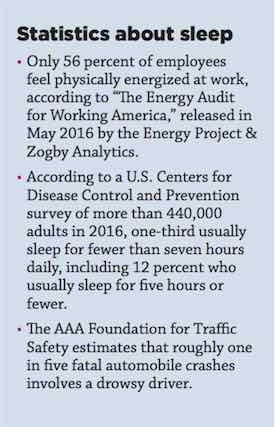Who is a member?
Our members are the local governments of Massachusetts and their elected and appointed leadership.
 Regardless of which line of work employees engage in, if they are fatigued on the job, their work will suffer. Their safety could also be at risk, along with the safety of the public around them, especially when employees work long hours.
Regardless of which line of work employees engage in, if they are fatigued on the job, their work will suffer. Their safety could also be at risk, along with the safety of the public around them, especially when employees work long hours.
People often cite the limited amount of sleep they get in a prideful way, as if being able to function on limited sleep should be admired.
While the length of a “complete” night’s sleep can vary from one individual to the next, the National Sleep Foundation recommends that adults get between seven and nine hours of sleep each night.
The human body naturally feels tired at night and alert during the day, but work schedules often dictate or override this “design” and require employees to override their natural sleep patterns. As a result, an overtired work condition has become the norm for many.
According to the National Safety Council, more than 43 percent of workers are sleep-deprived. Those most at risk work the night shift, long shifts, or irregular shifts. Indeed, 62 percent of night shift workers complain about sleep loss.
National Safety Council also reports that safety decreases as employees become tired, and fatigued worker productivity costs employers $1,200 to $3,100 per employee annually. Employees on rotating shifts are particularly vulnerable because they cannot adapt their “body clocks” to an alternative sleep pattern.
Fatigue is especially dangerous for motor vehicle operators, including those in local public works and public safety departments.
A study by Clear Roads found that snowplow drivers face multiple challenges, including often working between 2 and 6 a.m., when human energy levels are typically lowest. The number of hours they work is often not limited by state or federal guidelines, and at times crews work around-the-clock shifts due to winter snow emergencies. Snowplow drivers are subject to the hypnotic effect of blowing snow and the vibration and noise of winter maintenance equipment.
Municipal employees might not be flying planes, but National Business Aviation Association studies show that just two hours of lost sleep affects performance in the same manner as having a blood alcohol concentration of .05 percent. Four hours of lost sleep can impair performance equivalent to a .10 percent BAC, which would be considered legally impaired in the U.S. A fatigued driver can be just as bad as a drunk driver; therefore, rest is critical.
Combatting sleep challenges
How can managers help employees combat these sleep challenges? Here are a few approaches:
• Encourage employees to take a 20-minute nap. Research shows that just 20 minutes can have an incredible impact on sleep recovery. If a nap isn’t possible, encourage employees to relax during the day (close eyes and just be quiet; meditate; listen to music; breathe; stretch). Perhaps space can be made available in an employee lounge or spare office.
• Provide healthy snacks that include protein to sustain the appetite, like fresh fruit with nuts or fresh fruit with cheese.
• Remind employees to take breaks and get up from their desk or from behind the wheel and move regularly with stretching or walking.
• Provide plenty of water employees can drink throughout the day, and reduce or remove sugary foods, snacks, and sodas from the workplace.
• Remind employees to get a good night’s sleep in a quiet and dark room without television or mobile devices, do breathing or meditation-type exercises a bit before bedtime, stretch, and avoid caffeine after 3 p.m. and late heavy meals.
It is particularly important to take care of employees working long hours in extreme temperatures. Encourage them to keep extra dry clothes in both their truck and locker, and provide bunk rooms at the public works facility if possible. Encourage breaks and provide warm meals, hot coffee or tea, and water during long-duration storms.
Investments made in reducing employee fatigue will improve overall productivity, reduce the risk of accidents and loss, and, perhaps most importantly, increase the safety of workers and the general public.
Lin Chabra is MIIA’s Membership Training Manager.